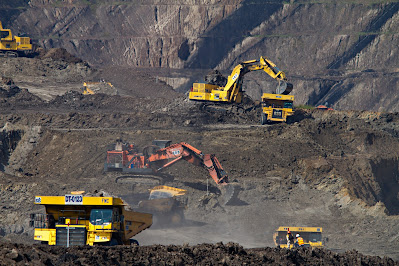Mining in African
Africa has been of significant contribution to the world's mining sector. Statistics show that almost 30% of the world's minerals come from Africa.
The world's natural gas takes up 8%, and oil, up 12%.
Mining in Africa initially began in 1852 in South Africa, when a copper project was constructed in a town known as Springbok in Northern Cape Province.
During the 15th century, native Africans didn't know much about the value of minerals such as gold, palm oil, and Ivory that they used to trade with the Portuguese.
They exchanged such precious minerals for commodities such as beads, guns, salt, etc.
As the world proliferates, Africans learn how their soil sits on abundant wealth; unfortunately, it is a lesson learned the hard way as it has always been on the continent.
Today, Africa has got quite a wide range of minerals that the other part of the world closely watches.
The continent is ranked first for vermiculite cobalt, bauxite, coal, and phosphate mineral reserves.
Africa is remarkably known for exporting two of the world's minerals known as gold and diamonds, which contributes highly to the continent's mining industry.
Major countries responsible for this significant contribution are Botswana, South Africa, and the Democratic Republic of Congo, being the largest producer.
Africa's GDP growth shows that mining adds 8.2% to its development, beating other economic sectors such as agriculture which only contributes 2.6% of GDP.
This makes countries like China, Canada, and the USA the biggest consumers of Africa's minerals, with Canada owning most of the mining companies on the continent.
 |
| Mining grounds |
Top 10 mineral Rich Countries in Africa
Africa might be rich in minerals, but not every country on the continent falls into this category.
Countries like Uganda, Burundi, etc., contribute little to Africa's mining sector.
While countries like Tanzania, Kenya, Botswana, etc., are behind Africa's magnificent contribution to its mining game.
Here are the top 10 African countries rich in world-known minerals.
⦁ Democratic Republic of Congo
⦁ Botswana
⦁ South Africa
⦁ Namibia
⦁ Ghana
⦁ Egypt
⦁ Mozambique
⦁ Tanzania
⦁ Angola
⦁ Mali
A graph showing Africa's top 5 mined minerals
 |
| Comparison graph showing top 5 minerals mined in Africa |
Problems Facing African Mining Sector
Some countries lack the modern technology to benefit from their minerals fully, and the corrupt systems make it so hard for their people to mine in their countries.
This comes in a way that the big political class sells off mining projects to western countries with the potential and capability to carry out minings.
And, money from mining deals benefits only a handful of these political individuals.
The lack of modern technology and equipment affects most African countries in so many ways: even if the minerals are mined in these countries, 61% of the minerals are processed and refined in western countries.
Also, very few African countries own any mining companies in their own countries as it's seen that they only hold a few shares, with the biggest going to other foreign countries.
Lack of knowledge about the minerals in most African countries is another factor that impacts the African mining sector.
For example, in some Kenyan rural parts like Baringo, Pokot and Turkana, the natives used gems like emerald agate stones to hit their animals while grazing.
Some even could see these gems daily but lacked knowledge about such precious minerals.
For instance, if it weren't for a foreigner to spot a ruby particle in mud on one of the local's shoes, ruby wouldn't have been discovered in Baringo County in Kenya.
Lack of market for most minerals in African countries.
Many African countries have these minerals, and some have gained some information about the wealth they are sleeping on, but the thing is... African mineral market is controlled in foreign countries.
It means these countries choose what to buy, for how long, at what price, and when to buy.
Unfortunately, this issue leaves African growth staggering and slows down its development.
African currency negligence— While it's clear that most African currencies are undervalued, the continent pays a huge price for this issue.
African countries have to exchange their money into foreign currencies to carry out any transaction, be it debt or just a business deal, which is not the case in other countries.
 |
| Mining tunnels |
Adverse Mining Effects on Africans
Many African countries depend entirely on mining, which risks their dependence on this economic activity.
This risky behaviour has affected the African natives who fully rely on mining. Here are a few of the negative effects mining has impacted on Africans:
⦁ School dropouts
⦁ Deforestation
⦁ Loss of lives
⦁ Landslides
⦁ Witchcraft actions
⦁ Conflicts
⦁ Family neglect
⦁ Pollution
⦁ Corruption
⦁ Child labour
School Dropouts
This effect is one of many factors that have hard-hit Africans in the ming sections.
Many parents ask for help from their kids in the mines, which leads to kids getting familiar with the activity and dropping out of school to concentrate on mining fully.
Some parents forcefully drop their kids out of school to help them work in mines to increase production.
This habit is propelled by poverty and extremely bad living conditions.

|
| Four out of ten kids drop out of school every month |
Deforestation
As mining takes place, many trees are cut down to either build mining temporary infrastructures, or mining-hole stairs and sometimes trees are cleared to reach suitable mining spots.
This act has resulted in severe deforestation, risking drought, which is a major factor Africa faces.
 |
| Deforestation |
Loss of Lives
Under some circumstances, many lives have been lost on mining grounds.
These circumstances may be due to p asoor mining conditions, lack of adequate mining equipment to carry out safe mining activities, etc.
There have been cases where mines have closed up on people in them, and many lives have been lost.
Some loss of lives has occurred due to envy and jealousy. Due to the lack of strong laws to govern the mines and miners, people have been brutally murdered out of jealousy to acquire more valuable minerals than others.
 |
| Murder crime scene |
Landslides
The lack of geology knowledge and sensitization about mining has left many miners vulnerable to landslides.
As they dig deep in the earth's crust in search of gems and minerals, the ground experiences weakness and cracks due to large holes in it that can easily sink in or drift over during heavy rains.
This act causes landslides and loss of lives too.
 |
| Landslides |
Which Craft Actions
Africa has got many people with many different cultures and beliefs. And some of these beliefs can be fatal.
These beliefs include offering a human sacrifice to get the rarest and most valuable minerals. It might sound sceptical, but it's practised in some mining groups.
While this might not necessarily be associated with witchcraft, some African cultures don't allow women to go to mines simply because they believe it is bad luck.
This can cause weird witchcraft activities if a woman mistakenly goes to the mines.
 |
| Which craft stuff |
Conflicts
One main factor that has led to unending conflicts in Africa is minerals.
Governments want to control and manage minerals which makes the locals feel like they are being left out over what they truly believe is rightfully theirs.
It creates local rebel groups who claim to be fighting for their rights and minerals, which only results in massive loss of lives and constant conflicts in these regions.
 |
| Conflicts image |
Family Neglect
Mining in Africa is almost a full-time job. It is a very demanding job that leaves one almost committed to it.
Parents, especially men, give all of their time to their job, which results in family neglect.
A parent would wake up at around 6 am, head over to work, and close at around 9 pm just to come back home to sleep. The routine goes on like that.
Mining has caused pollution worldwide, but in Africa, it has done quite noticeable effects.
Mining factories, especially the oil sector, release chemicals and objects such as plastics into the air, land and water sources that pollute the environment.
 |
| Pollution |
Corruption
As mentioned earlier, corruption has made mining in Africa a worthless economic activity and a time-wasting one.
Governments sell over projects to foreign investors who take over full control over the mines, leaving the locals with nothing.
The money these investors pay goes to a few powerful individuals, creating more poverty and scarcity of jobs in these countries.
 |
| Corruption image |
Child Labor
Communities that fully depend on mining as their source of daily bread risk engaging kids in mining activities.
Children as young as seven years in such countries engage in dangerous mining activities.
This critical problem happens by either parents approving them to work there or through tough circumstances such as poverty that leave no option for the kids to engage in such exhausting activities.
 |
| Child labour |
Gemstones Mining in Africa
As wealthy as the African soil is, the continent is a den of most of the world's popular and most valuable gemstones, such as diamonds.
For centuries, the African continent has produced high-quality diamonds, for instance, Cullinan diamonds and other world precious stones.
However, this makes Botswana the king producer of diamonds in Africa, estimated to be 11 million carats (2,200 kg).
Nigeria dominates the first position as the largest gems producer on the continent, with an estimated $3 billion worth of gems exportation yearly.
Nigeria has gem deposits of minerals such as beryl, garnet, corundum, tourmaline, spinel, quartz, aquamarine, and many more.
Also, Mozambique is the number one largest producer of ruby gems in Africa. Mozambique ruby gems are known for their unique high quality and rich hue.
It has attracted many ruby-lovers to the country.
In 2007, Madagascar was the biggest world leader in sapphire production.
Its sapphire deposits are around Ilakaka town.
The country also is the only place where grandidierite (an extremely rare kind of sapphire) is mined.
Zambia is also recognized as the leading producer of emeralds in Africa. Its emeralds are considered highly valued compared to any other African country's emeralds.
The country makes about $200 million annually from emerald exportation.
These African countries lead in producing the world's big four and only precious gemstones.
Graph Showing Top 5 African Countries that Lead in Gems Mining
 |
| Gemstone graph |
















Comments
Post a Comment
Thanks for commenting. Here at Gems Essence, we're glad that you are part of us.